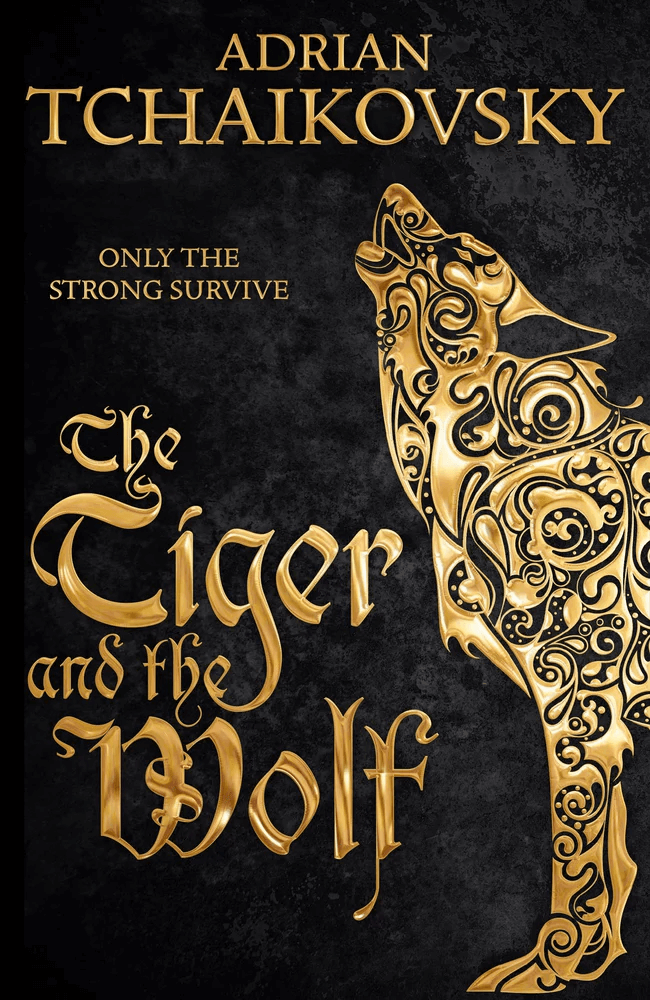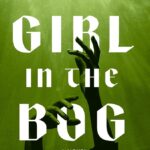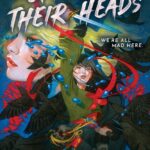
soupçon/ˈsuːpsɒn,ˈsuːpsɒ̃/ noun
1. a very small quantity of something; a slight trace, as of a particular taste or flavorSunday Soupçons is where I scribble mini-reviews for books I don’t have the brainspace/eloquence/smarts to write about in depth – or if I just don’t have anything interesting to say beyond I LIKED IT AND YOU SHOULD READ IT TOO!
I’ve had a very hard time trying to put my thoughts into words about these two – I think this is the best you’re going to get.

Genres: Fantasy, Secondary World Fantasy
Representation: Native American-coded MCs, Central American-coded MCs
PoV: Thid-person, past-tense, multiple povs
ISBN: 023077007X
Goodreads

In the bleak northern crown of the world, war is coming
Maniye's father is the Wolf clan's chieftain, but she's an outcast. Her mother was queen of the Tiger and these tribes have been enemies for generations. Maniye also hides a deadly secret. All can shift into their clan's animal form, but Maniye can take on tiger and wolf shapes. She refuses to disown half her soul, so escapes, rescuing a prisoner of the Wolf clan in the process. The killer Broken Axe is set on their trail, to drag them back for retribution.
Maniye's father plots to rule the north and controlling his daughter is crucial to his schemes. However, other tribes also prepare for strife. Strangers from the far south appear too, seeking allies in their own conflict. It's a season for omens as priests foresee danger, and a darkness falling across the land. Some say a great war is coming, overshadowing even Wolf ambitions. A time of testing and broken laws is near, but what spark will set the world ablaze?
I feel like this book pretty perfectly encapsulates why only 13% of my reads are by male authors.
The thing is, I loved it. I thought The Tiger and the Wolf was bloody excellent, even if the first half is definitely weaker than the second. I loved the premise, I loved so much of the worldbuilding, I loved the setting (even though, my gods, I am So Done with freezing, snowy settings). I loved the cast, and the very complicated dynamics that tie them together.
But Jesus H Christ, the fucking Choices That Were Made.
Let’s start with the fact that Maniye, the main character – not the only pov character, but the person the entire book revolves around – is fourteen years old. This is not a YA novel; it is very much Adult, and I would really like to sit Tchaikovsky down and ask him why he decided his MC had to be 14. Why he added in an (attempted) forced-marriage to the story, of a grown-ass man to said 14yo. Why he had that 14yo endure epically horrible rape threats while a captive. Neither of those things were necessary to the plot; they were gratuitous as fuck, and would have been deeply unpleasant even if Maniye had been 16 or 18 or any other age, for that matter.
But with a 14yo protagonist, that goes past thoughtlessly, gratuitously gross into what the actual fuck did you just write.
Why are the hyena shapeshifters, who are matriarchal, called the Laughing Men? Shouldn’t that be Laughing Women, then? Why can’t women wolf-shifters be chiefs? Why are female hawk (or eagle? It was never super clear to me) shapeshifters forbidden from shifting (accessing a vital part of their soul, according to in-world lore) or even speaking? Why do so many peoples have men with multiple wives, and no examples of women with multiple husbands?
Why the fuck did you bake so much misogyny into your (otherwise incredible) worldbuilding? That was a choice. You chose, over and over, to include it, to create it, even – because this is Fantasy, where you invent, create, everything. You make the rules. And you decided that the rules would be sexist.
(Do not give me any crap about how male animals, in most species, are bigger than females. So??? We’re talking about shapeshifters, who spend most of their time human, whose human behaviour does not at all perfectly mimic the behaviour of their ‘mute’ animal brethren. Male animals being bigger doesn’t have to translate to male shapeshifters having all the rights and female ones having none. Especially because, again, this is FANTASY, where the storyteller can do literally whatever the fuck they want.)
It’s not that women don’t write books like this too. Internalised misogyny is a thing, as is thoughtlessly utilising what are commonly considered Default Fantasy Worldbuilding Things (which are so often sexist as hells). But in my experience, I’m at least less likely to get this much misogyny in SFF written by women and nonbinary folx.
Not guaranteed to find none. Alas. But less likely to have so much of it forced down my throat that I choke on it.
I’ve read 184 books so far this year. Only 24 of them, at a quick count, were written by men. Just 13% of my total reading. Books like The Wolf and the Tiger are why that percentage is unlikely to change any time soon.

Genres: Fantasy, Portal Fantasy
Representation: Major achillean pov character, major bi/pansexual character
PoV: Third-person, past-tense, multiple povs
ISBN: 9781776562626
Goodreads

Taryn Cornick believes that the past is behind her -- her sister’s death by violence, and her own ill-conceived revenge. She has chosen to live a life more professional than personal. She has written a book about the things that threaten libraries -- insects, damp, light, fire, carelessness and uncaring. The book is a success, but not all of the attention it brings her is good.
There are questions about a fire in the library at Princes Gate, her grandparents’ house, and about an ancient scroll box known as the Firestarter. A policeman, Jacob Berger, has questions about a cold case. There are threatening phone calls. And a shadowy young man named Shift appears, bringing his shadows with him. Taryn, Jacob, Shift — three people are driven towards a reckoning felt in more than one world.
The Absolute Book is an epic fantasy, intimate in tone. A book where hidden treasures are recovered; where wicked things people think they’ve shaken from their trails find their scent again. A book about beautiful societies founded on theft and treachery, and one in which dead sisters are a living force. It is a book of journeys and returns, set in London, Norfolk, and the Wye Valley; in Auckland, New Zealand; in the Island of Apples and Summer Road of the Sidhe; at Hell’s Gate; in the Tacit with its tombs; and in the hospitals and train stations of Purgatory.
This was one of the strangest reading experiences of my life – not because The Absolute Book is written in an experimental or mindfuck way, like Hal Duncan’s Vellum, but because l went through so much whiplash as to whether or not I was enjoying myself.
I can happily say I loathed the beginning. The first chunk of the book reads like a particular flavour of pretentious lit-fic that bores me to fucking tears; it takes a while for the magical elements to show up. But then they do start to show up, bit by bit, and I tried very hard to be more invested.
But I was so. Very. Bored.
I’ve read and loved a bunch of Knox’ other books, so I wasn’t prepared for how, here, she describes every little piece of every little action. Instead of saying ‘she got up to wash her face’, it’s ‘She pushed the blanket back. She swung her legs onto the floor. She got up. She walked to the bathroom. She turned on the taps. She splashed cold water on her face. She turned the taps off again.’ And it drove me up the WALL.
In a story about chronic pain, it makes sense: when your spoons are limited, you spend one on each part of an action, not one for the entire action. Getting dressed isn’t one spoon; it’s one spoon to get up, one to get to the wardrobe, one to choose what to wear, one to get the item of clothing over your lead, and on a bad day, one for each button. So when you’re writing a character with chronic pain/fatigue/some kind of disability, writing this way makes sense; you’re conveying to the reader just how much effort goes into getting even the simplest thing done.
But this isn’t a story about chronic pain, or depression, or anything else where spoon theory applies. The effect was to slow down the writing and drag the reader through the most mundane, irrelevant stuff that just bogged everything down.
WHY?
And then there would be a passage, or even a whole chapter, that was breathtaking; beautiful, surprising, full of wonder. And I would be amazed and delighted and keep on turning the pages.
Only to be hit with the mundanity again.
On the balance? I would say it wasn’t worth it. The magical worldbuilding was disappointingly simple, and Knox does that MADDENING thing where the most interesting parts of the story happen before or after the events of the book. Not only does the search for the Quest Object fall into place so very easily and quickly at the end, we never get to see how it’s used. There’s all kind of inter-dimensional, inter-world politics going on that we don’t get to see; and the origins of the fae, when they’re revealed, are absolutely fascinating, but again – that was thousands of years before the start of The Absolute Book. We don’t get to see or explore them. The fae themselves are all sheep-like, for the most part, just sort of drifting through their world without doing anything, as individuals or as a society.
View Spoiler »I think there was the skeleton of a really epic story here, but Knox zoomed in on the wrong places and never turned the camera towards the massively interesting bits – maybe because those parts would have been harder to write? The choices she made feel lazy from a writing perspective, but I don’t know. As-is, The Absolute Book is not an absolute mess, but it’s still not one I’d recommend.






Leave a Reply